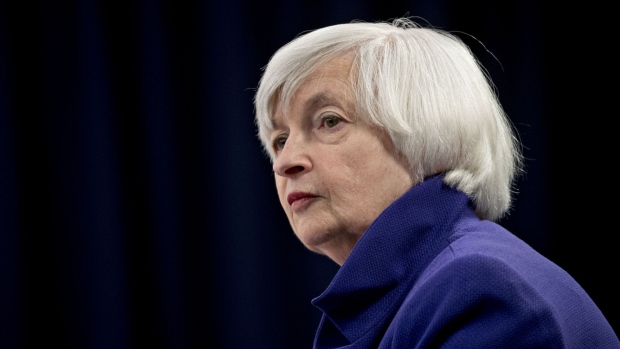Apr 11, 2023
Yellen Downplays Banking Woes, Says World Economy Has Improved
, Bloomberg News

(Bloomberg) -- US Treasury Secretary Janet Yellen shrugged off recent banking spasms to declare the economy better off than six months ago, saying she didn’t believe the banking turmoil had restricted the availability of credit in the US.
“I’ve not really seen evidence at this stage suggesting a contraction in credit, although that is a possibility,” Yellen said Tuesday during a press conference in Washington. “The US economy is obviously performing exceptionally well with continued solid job creation, inflation gradually moving down and robust consumer spending. So I’m not anticipating a downturn in the economy, although of course that remains a risk.”
The Treasury head’s remarks come at the outset of the World Bank and International Monetary Fund’s spring meetings in the US capital.
Yellen’s perspective on US credit came even after Federal Reserve data on Friday showed lending in the US contracted by the most on record in the last two weeks of March. The tumble came in the wake of the dramatic failure of two mid-sized US lenders in March that threatened to destabilize the financial system and undermine growth. The near-collapse of European banking giant Credit Suisse Group, also in March, shook investors worldwide.
Her comments contrast with the IMF’s revised economic outlook for 2023, released Tuesday, which trimmed its global growth projections to 2.8% this year and 3% in 2024. The report cited uncertainty and risks as financial sector stress added to pressures from tighter monetary policy and Russia’s invasion of Ukraine.
Read More: IMF Trims World Growth Outlook as Financial Risks Raise Pressure
French Finance Minister Bruno Le Maire, speaking to reporters in Paris before departing for the US, also delivered a gloomier take.
“We are faced with an economic situation that his more difficult with global growth that is slowing and persistent inflation in many countries,” Le Maire said Tuesday. “Global growth should be below 3% in 2023, which is one of the weakest rates for decades, excluding the Covid pandemic and the financial crisis in 2008.”
Yellen, a former chair of the US central bank, noted that inflation remained too high, yet said she saw “welcome signs over the past half-year that inflation has moderated.”
The Treasury chief made only a glancing reference to the banking tremors in her prepared remarks, before voicing confidence in international financial infrastructure.
“The US banking system remains sound, with strong capital and liquidity positions,” she said. “The global financial system also remains resilient due to the significant reforms that nations took after the financial crisis.”
Yellen also outlined her priorities for the week. They included pushing China to agree to debt-restructuring talks for Zambia and other poor countries, pushing for reforms at the World Bank and urging countries to continue supporting Ukraine in its war with Russia.
Asked whether the Biden administration’s push to reduce supply-chain dependence on China — a strategy she calls “friendshoring” — Yellen rejected the notion the policy would hurt economic growth across the globe by disrupting trade ties.
“The argument that friendshoring is going to cause huge fragmentation and loss of the benefits of trade is really not valid,” she said. “I see it friendshoring is an approach to dealing with supply-chain risks that are very real, but maintaining tremendous scope for global trade to continue. We’re mainly concerned about over-dependence on China.”
--With assistance from William Horobin.
(Updates with further Yellen comments, starting in second paragraph.)
©2023 Bloomberg L.P.






